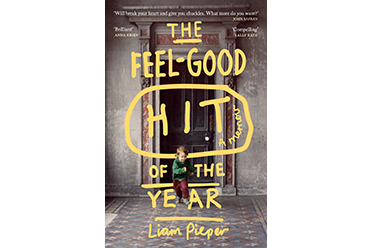 Hilarious, compelling and sometimes heartbreaking, Liam Pieper’s The Feel-Good Hit of the Year is a memoir about family, addiction and learning how to live with yourself, from a sharp and original new Australian voice.
Hilarious, compelling and sometimes heartbreaking, Liam Pieper’s The Feel-Good Hit of the Year is a memoir about family, addiction and learning how to live with yourself, from a sharp and original new Australian voice.
Liam Pieper was raised by his bohemian parents to believe in freedom and creativity, and that there’s nothing wrong with smoking a little marijuana to make life more interesting.
A fast learner, Liam combined hippie self-actualisation with gen Y entrepreneurialism. By his early teens he had a fledgling drug habit, and a thriving business selling pot around the suburbs of Melbourne from the back of his pushbike.
He picked up important life skills, like how to befriend a deranged jujitsu master, how to impress his girlfriend’s mother by getting arrested in front of her, and how to negotiate pocket money based on how much he was charging his parents for an ounce.
But from these highs (chemical, financial and otherwise), Liam’s life fell to dramatic lows. The muddled flower child became a petty criminal and an amoral coke monster. After a family tragedy and then his arrest on several counts of possession and trafficking, Liam had to consider: had it been a mistake to adopt the practices of a counterculture without any of its ethics?
An Extract from The Feelgood Hit of The Year:
Labassa is a sprawling 35-room manor that was remodelled in 1890 by Alexander Robertson, one of the transport magnates behind Cobb & Co., who sunk his fortune into property. It was built as a family home, and, more than that, to show off Robertson’s unbelievable wealth. In the centre of 15 acres of parkland, Labassa was all ostentation: ballrooms, grand halls, parquetry and marble statuary.
It was magnificent – the ultimate in nineteenth-century flamboyance, from the embossed wallpaper to a three-storey tower that loomed over the manor and its grounds. Later the parkland was sold off for housing and the manor itself was crudely subdivided with fibro and wood into flats, and then gradually declined into something a little more slum-ish.
By the time I was born, Labassa was a palimpsest of the lives herded through there by the fickle twentieth century. The walls of the grand entrance hall and front rooms were stained with cigar smoke from the twenties. In the forties it was bought by an émigré businessman, a Polish Jew who’d fled Nazi persecution, and it went through a string of Jewish owners who sponsored refugee families.
In the fifties it housed many Jewish survivors of the Holocaust, who pieced their lives back together as best they could, kosher-butchering their poultry in the upstairs bathroom, where two decades later hippies would take acid and lie back to relax as the Victorian murals turned into Magic Eye puzzles.
A wave of drug-addled beatniks then moved in, and throughout the sixties and seventies the place was frequently raided by the cops, until the beatniks were finally driven out and replaced by a group of more restrained, cerebral bohemians, including my family, and then, in 1984, me.
“Liam Pieper is a truly gifted writer and storyteller. The Feel-Good Hit of the Year is often hilarious, at times heartbreaking and always a fascinating view into an unconventional but compelling life.” – Lally Katz
Liam Pieper lives in Melbourne. He studied creative writing and then journalism and now works as a freelance writer. Before that he worked as a chef, a music critic, a non-union itinerant labourer and a mediocre criminal. His work has appeared in Meanjin, The Best of The Lifted Brow, Going Down Swinging and The Sleepers Almanac, and he is the co-recipient of the 2014 M Literary Residency.
The Feel-Good Hit of the Year is published by Penguin Australia and is available from all leading book retailers. For more information about Liam Pieper, visit: www.liampieper.com for details.
Image: The Feel-Good Hit of the Year book cover
